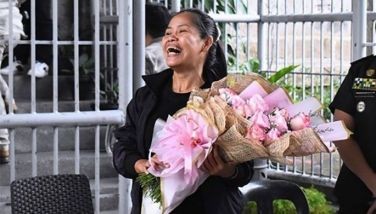More Maguindanao villagers now open to family planning
September 29, 2003 | 12:00am
SHARIFF AGUAK, Maguindanao — Despite their traditions and misconceptions, more Maguindanaoans now accept the government’s family planning methods as means to alleviate their poverty.
Since last January alone, Dr. Hadji Tahir Sulaik, chief of Maguindanao’s Integrated Provincial Health Office (IPHO), said 42 Maguindanaoan men have undergone vasectomy.
"Only about 10 Maguindanaoans underwent vasectomy from 1996 to 2002. There are indications that men in Maguindanao are now more open to the need for them to cooperate with their wives in planning their families," Sulaik said.
Citing recent studies by his office, he said even Muslim religious leaders now support their family planning program in impoverished communities.
"In health dialogues we initiate in remote areas, religious leaders voluntarily speak about the importance of family planning as a means to guarantee the welfare of each member of the family," he said.
Sulaik, himself a Maguindanaoan who has thrice joined the annual Hajj, or pilgrimage to Mecca in Saudi Arabia, said Islam has explicit teachings on "efficient management of families," which also delve on birth spacing and the welfare of family members.
The Qur’an, he said, also encourages mothers to breastfeed their babies.
"In the past decades, only Maguindanaoan women would secretly ask health workers in their communities about family planning because they were so burdened with having so many children and had meager resources to sustain their respective families," Sulaik said.
A contemporary Maguindanaoan historian, lawyer Michael Mastura, a peace negotiator of the Moro Islamic Liberation Front, said Islam has extensive teachings on man’s spiritual obligation to uphold the welfare of a woman and value her role in building God-fearing families.
"We must also respect their reproductive role not in the context of them giving us many children, but by focusing on their profound mission in rearing the children to become responsible people, and their physical limitations in performing such a role," Mastura said.
Mastura said man, in Islam, is the protector of woman and his family and thus, should see to it that the welfare of each of his dependents should not be compromised by having so many children just to project masculinity and superiority.
Sulaik said they are optimistic that they can achieve, with the help of local religious and political leaders, their objective of fully promoting the government’s family planning program in far-flung communities.
"There are positive indications that we are gaining headway in this thrust. Apart from seeing the Maguindanaoan men become keen on planning their families, we have also been seeing more of our men volunteer as health workers in their communities," he said.
Since last January alone, Dr. Hadji Tahir Sulaik, chief of Maguindanao’s Integrated Provincial Health Office (IPHO), said 42 Maguindanaoan men have undergone vasectomy.
"Only about 10 Maguindanaoans underwent vasectomy from 1996 to 2002. There are indications that men in Maguindanao are now more open to the need for them to cooperate with their wives in planning their families," Sulaik said.
Citing recent studies by his office, he said even Muslim religious leaders now support their family planning program in impoverished communities.
"In health dialogues we initiate in remote areas, religious leaders voluntarily speak about the importance of family planning as a means to guarantee the welfare of each member of the family," he said.
Sulaik, himself a Maguindanaoan who has thrice joined the annual Hajj, or pilgrimage to Mecca in Saudi Arabia, said Islam has explicit teachings on "efficient management of families," which also delve on birth spacing and the welfare of family members.
The Qur’an, he said, also encourages mothers to breastfeed their babies.
"In the past decades, only Maguindanaoan women would secretly ask health workers in their communities about family planning because they were so burdened with having so many children and had meager resources to sustain their respective families," Sulaik said.
A contemporary Maguindanaoan historian, lawyer Michael Mastura, a peace negotiator of the Moro Islamic Liberation Front, said Islam has extensive teachings on man’s spiritual obligation to uphold the welfare of a woman and value her role in building God-fearing families.
"We must also respect their reproductive role not in the context of them giving us many children, but by focusing on their profound mission in rearing the children to become responsible people, and their physical limitations in performing such a role," Mastura said.
Mastura said man, in Islam, is the protector of woman and his family and thus, should see to it that the welfare of each of his dependents should not be compromised by having so many children just to project masculinity and superiority.
Sulaik said they are optimistic that they can achieve, with the help of local religious and political leaders, their objective of fully promoting the government’s family planning program in far-flung communities.
"There are positive indications that we are gaining headway in this thrust. Apart from seeing the Maguindanaoan men become keen on planning their families, we have also been seeing more of our men volunteer as health workers in their communities," he said.
BrandSpace Articles
<
>
- Latest
- Trending
Trending
Latest
Trending
Latest
Recommended



























